| |
| Breaking
the Impasse: Forging an EU Leadership Initiative on Climate Change |
|
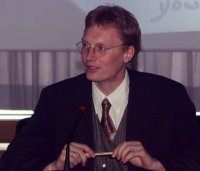 Dr.
Sebastian Oberthür, Ecologic Berlin, and Dr. Hermann E. Ott, Wuppertal
Institute for Climate, Environment and Energy, outlined their proposal
for a "European Union Leadership Initiative on Climate Change".
The discussants were Bill Hare, Greenpeace International, and Lydia
Popova, a leading environmental activist from the Russian Federation. Dr.
Sebastian Oberthür, Ecologic Berlin, and Dr. Hermann E. Ott, Wuppertal
Institute for Climate, Environment and Energy, outlined their proposal
for a "European Union Leadership Initiative on Climate Change".
The discussants were Bill Hare, Greenpeace International, and Lydia
Popova, a leading environmental activist from the Russian Federation.
 In our RealAudio presentation Oberthür and Ott outline their proposal
and Bill Hare responds.
In our RealAudio presentation Oberthür and Ott outline their proposal
and Bill Hare responds.
- A
deep depression: Hermann Ott explains the origins of the Leadership
Initiative proposal, which took shape as Ott and Oberthür completed
work on their book, The Kyoto Protocol: International Climate
Policy for the 21st Century (1999).
- A
call for leadership: Sebastian Oberthür explains the authors'
reasons for doubting that effective climate policies will be implemented
without the leadership of the European Union.
- The
EU can do it with a little help from its friends: Ott describes
how a coalition of countries led by the European Union and Japan
can bring about the Entry into Force of the Kyoto Protocol. The
proposal includes suggestions for bringing the Russian Federation
and economies in transition on board.
- Decarbonization
begins at home: Oberthür underlines the fundamental importance
of domestic implementation and leading by example in international
environmental agreements. This thought lies behind the proposal's
call for early domestic action by the EU.
-
Adaptation, not alienation: Ott outlines the proposal's call
for a constructive engagement with developing countries, commencing
with an offer by industrialized countries to address adaptation
needs in non Annex-l countries. He described the US position on
developing country participation as "deeply alienating."
-
When a good idea is in the air: Bill Hare, Greenpeace International,
welcomes the call for a European Union Leadership initiative and
describes how he anticipated a number of its elements in his own
thinking.
Useful Contacts:
|
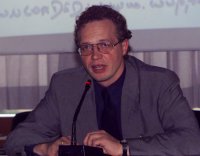
| Hermann
E. Ott, Acting Head of Climate Policy Division, Wuppertal
Institute for Climate, Environment and Energy |
|
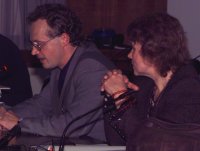
|
|
The
European Bubble was one of the early signs of leadership by
the European
Union in the climate change negotiations. Has the time come
for a new leadership initiative ? |
|
| Youths
champion the nuclear option |
|
 How
much CO2 do you think is being avoided by the use of nuclear power
in Europe annually? This is the question that the European Nuclear
Society (http://www.euronuclear.org)
in collaboration with the 'Young Generation' posed outside the Martitim
Hotel. They stress that nuclear generation is already avoiding global
carbon emissions and said that currently the electricity generated
by nuclear power stations in the EU avoids 800 million tonnes of
CO2 each year. To demonstrate this, How
much CO2 do you think is being avoided by the use of nuclear power
in Europe annually? This is the question that the European Nuclear
Society (http://www.euronuclear.org)
in collaboration with the 'Young Generation' posed outside the Martitim
Hotel. They stress that nuclear generation is already avoiding global
carbon emissions and said that currently the electricity generated
by nuclear power stations in the EU avoids 800 million tonnes of
CO2 each year. To demonstrate this, 800 balloons formed an arch overhead to symbolize the significant
role of nuclear power generation. The demonstrators emphasized a
balanced energy mix of all available energy sources and said every
country should be able to find its own balance.
800 balloons formed an arch overhead to symbolize the significant
role of nuclear power generation. The demonstrators emphasized a
balanced energy mix of all available energy sources and said every
country should be able to find its own balance.
|

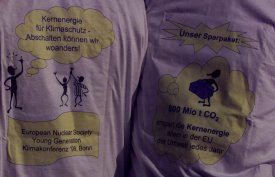
|

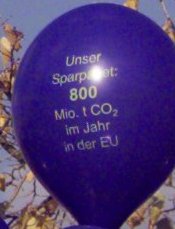
|
| Their
shirts bore the motto "Nuclear for climate protection - phase
out something else, not nuclear power."
The
balloons read "Package for Saving--800 million tonnes of CO2
saved each year in the EU." |
|
|
Clean
Energy 2000
|
 The
World Meteorological Organization in collaboration with the International
Clean Energy Consortium (ICEC) sponsored this event in order to
launch the CLEAN ENERGY 2000 Conference and Exhibition, which
will be held in Geneva from 24-29 January 2000. Technical, legal,
fiscal and financial solutions will be presented at the Millennium
Conference to help accelerate the implementation of the Kyoto
Protocol. Participants will discuss how adequate measures can
be taken to accelerate the development of the clean energy economy
in industrialized as well as in developing countries and how more
jobs this process can create. A new energy planning methodology
and ISO standard for action-oriented steps towards a sustainable
energy economy will be introduced. More information available
by contacting conference@cleanenergy2000.com
or visiting http://www.cleanenergy2000.com/ The
World Meteorological Organization in collaboration with the International
Clean Energy Consortium (ICEC) sponsored this event in order to
launch the CLEAN ENERGY 2000 Conference and Exhibition, which
will be held in Geneva from 24-29 January 2000. Technical, legal,
fiscal and financial solutions will be presented at the Millennium
Conference to help accelerate the implementation of the Kyoto
Protocol. Participants will discuss how adequate measures can
be taken to accelerate the development of the clean energy economy
in industrialized as well as in developing countries and how more
jobs this process can create. A new energy planning methodology
and ISO standard for action-oriented steps towards a sustainable
energy economy will be introduced. More information available
by contacting conference@cleanenergy2000.com
or visiting http://www.cleanenergy2000.com/
Above photo:
Gustav Grob (left) and Abdolreya Metghalchi (right), World Sustainable
Energy Coalition
|
|
A
business perspective on the Kyoto Mechanisms
|
 Peter Vis, Environmental Delegate of the EC, explains the importance
of maintaining trading control over CDM credits and underlines the
need to substantively define supplementarity under Article 17 of
the Kyoto Protocol. The side event, "A business perspective of Kyoto
mechanisms", was hosted by the International Chamber of Commerce
(ICC), with speakers representing the ICC, the United States Council
for International Business (USCIB), the International Energy Agency
(IEA), and an advisor in international environmental and scientific
affairs.
Peter Vis, Environmental Delegate of the EC, explains the importance
of maintaining trading control over CDM credits and underlines the
need to substantively define supplementarity under Article 17 of
the Kyoto Protocol. The side event, "A business perspective of Kyoto
mechanisms", was hosted by the International Chamber of Commerce
(ICC), with speakers representing the ICC, the United States Council
for International Business (USCIB), the International Energy Agency
(IEA), and an advisor in international environmental and scientific
affairs. |
|
Desertification
and Climate Change-making the links
|
Simon Khaya
Moyo, Minister of Mines, Environment and Tourism, Zimbabwe, Mohamed
Ag Erlaf, Minister of the Environment, Mali and Hama Arba Diallo,
Executive Secretary of the Convention to Combat Desertification
(CCD), convened a press conference
to highlight the interlinkages between climate change and desertification.
They stressed
that climate change will affect drylands by impacting on water
supplies and addressed heat extremes, the humidity and temperature
of soils, and agricultural production. At the same time, deforestation
and dryland degradation are influencing local climates, the global
carbon cycle, and the albedo effect. Diallo stressed that the
UNCCD and the UNFCCC can contribute to each other's objectives.
For example, the introduction of renewable energy technologies
can cut GHG emissions while easing pressure on the drylands by
providing an alternative to unsustainable biomass fuels.
|
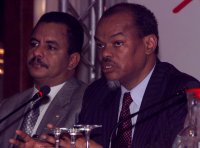
| Simon
Khaya Moyo, Minister of Mines, Environment and Tourism, Zimbabwe;
Mohamed Ag Erlaf, Minister of the Environment, Mali and Hama
Arba Diallo, Executive Secretary of the CCD
|
|
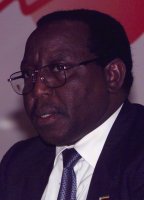
| Mohamed
Ag Erlaf, Minister of Environment, Mali |
|
|
Miscellaneous
|
|
The
front of the Maritim was closed off after an unidentified man threw
eggs and paint at members of one of the COP delegations. The assailant
was apprehended and it is not thought that the incident was related
to the Conference.
|

|
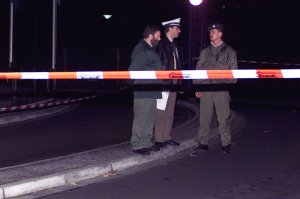
|
 To listen to IISD's RealAudio coverage of the COP-5
deliberations and side-events you will need the RealAudio Player. Download
the free Real Audio player by clicking on this button.
To listen to IISD's RealAudio coverage of the COP-5
deliberations and side-events you will need the RealAudio Player. Download
the free Real Audio player by clicking on this button.

|

 Wednesday, 3 November
Wednesday, 3 November

 Wednesday, 3 November
Wednesday, 3 November